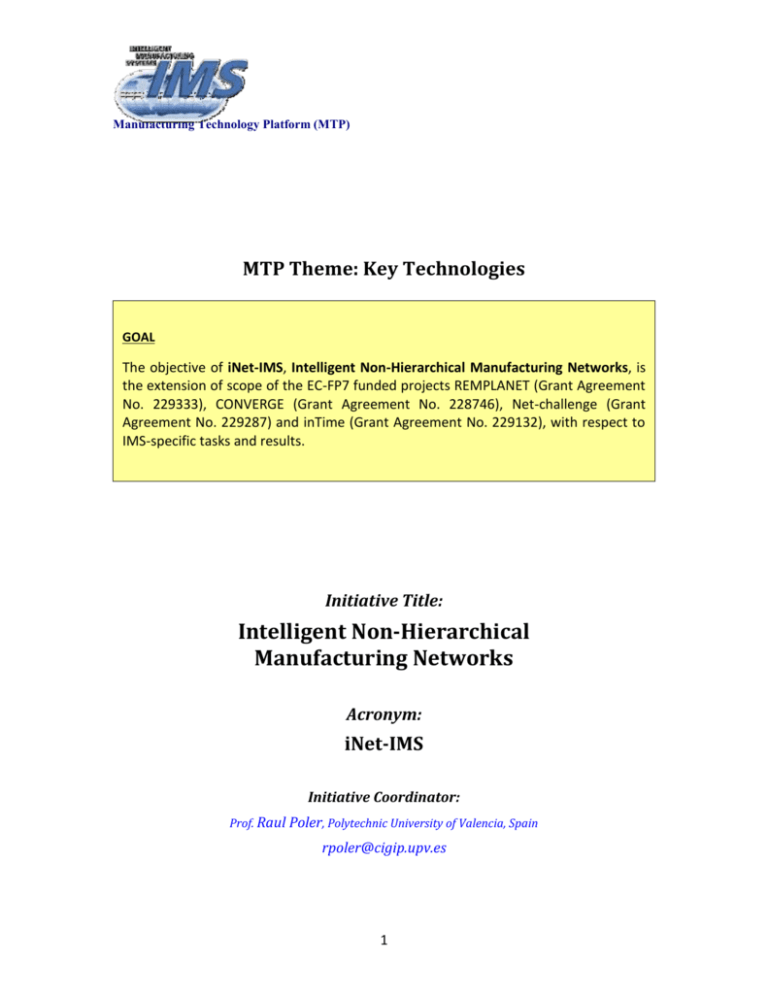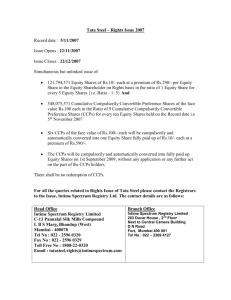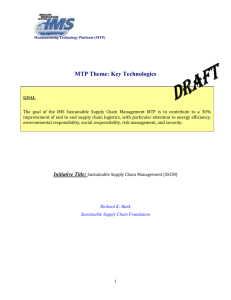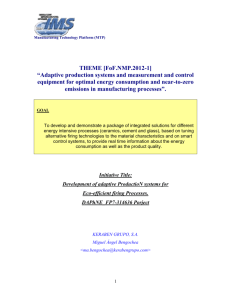iNet-IMS MTP Initiative v1.3 - Intelligent Manufacturing Systems
advertisement

Manufacturing Technology Platform (MTP) MTP Theme: Key Technologies GOAL The objective of iNet-IMS, Intelligent Non-Hierarchical Manufacturing Networks, is the extension of scope of the EC-FP7 funded projects REMPLANET (Grant Agreement No. 229333), CONVERGE (Grant Agreement No. 228746), Net-challenge (Grant Agreement No. 229287) and inTime (Grant Agreement No. 229132), with respect to IMS-specific tasks and results. Initiative Title: Intelligent Non-Hierarchical Manufacturing Networks Acronym: iNet-IMS Initiative Coordinator: Prof. Raul Poler, Polytechnic University of Valencia, Spain rpoler@cigip.upv.es 1 Manufacturing Technology Platform (MTP) INDEX 1 INITIATIVE TITLE: ..............................................................................................................3 1.1 R&D OBJECTIVES ..............................................................................................................3 1.2 OVERVIEW OF THE INITIATIVE ...............................................................................................3 1.3 PLANNED WORK, RESOURCES AND TIMING ..............................................................................5 1.4 PARTICIPATING REGIONS, PROJECTS INVOLVED AND PARTNERS .....................................................6 1.5 CONTACT INFORMATION .....................................................................................................8 2 Manufacturing Technology Platform (MTP) 1 Initiative Title: Intelligent Non-Hierarchical Manufacturing Networks (iNet-IMS) 1.1 R&D Objectives The objective of iNet-IMS, Intelligent Non-Hierarchical Manufacturing Networks, is the extension of scope of the EC-FP7 funded projects REMPLANET (Grant Agreement No. 229333), CONVERGE (Grant Agreement No. 228746), Net-challenge (Grant Agreement No. 229287) and inTime (Grant Agreement No. 229132), with respect to IMS-specific tasks and results. The four projects are under the Call “FP7-NMP-2008-SMALL-2” Activity code “NMP2008-3.3-1: Supply chain integration and real-time decision making in non-hierarchical manufacturing networks”, and started between May and September 2009. The objectives of the iNet-IMS initiative are: Analyse the needs that arise from the interactions and relationships between SMEs belonging to Non-Hierarchical Manufacturing Networks. Analyse recent technological innovation trends (mainly in terms of IS and IT) to support Decentralised Decision Making. Analyse existing standards for information exchange to support Collaborative Processes. Define a Framework for Collaboration in Non-Hierarchical Manufacturing Network context. o Strategic Model Network Design Network Development o Tactical Model Partners qualification and selection Performance Management o Operational Model Support Decision Making Performance Measurement 3 Manufacturing Technology Platform (MTP) 1.2 Overview of the Initiative In the new global market, competitiveness and growth of industry highly rely on the move toward innovative high performance industrial systems and agile networked enterprises through the creation and consolidation of Non-Hierarchical Manufacturing Networks of multi-national SMEs in front of networks based on powerful large-scale companies. The traditional hierarchical manufacturing networks are based on centralised models, where some of the involved actors must adapt themselves to the constraints defined by the dominant ones. Real-world experiences of such models have revealed some major problems due to the centralized vision of the supply chain and the sub-optimal performance of the centralized decision making. For current highly dynamic markets, this generates major inefficiencies in the operation of the whole supply chain. Centralized networks performance can be significantly improved through more harmonious and equitable peer-to-peer inter-enterprise relationships, conforming a decentralised and collaborative decision making model. Non-Hierarchical Manufacturing Networks provide major benefits mainly in terms of: - Enhanced overall competitiveness, innovation and adaptability in today and tomorrow’s enterprise partnership scenario. - Cross-country and inter-enterprise interchanges, building networked enterprises that are supported by stable relationship schemas and modern co-operation & co-ordination business paradigms. - Cost reduction, through overall optimisation and elimination of inefficiencies of processes, stocks, flows, plans, etc. - Companies’ human resources improved quality of work and skills, through improved knowledge management and dissemination, better understanding of dynamics and flows, and clearer definition of roles and responsibilities. - End consumers’ advantages, mainly in terms of diminishment of products timeto-market and costs. - SMEs empowerment and enhanced accessibility to networked enterprises. - Optimisation of materials, wastes and energy consumption based on more rational and homogeneous production and supply plans, stocks and workforce balance. Centralised models only take into account the central nodes of the supply chain. The main innovation provided by the Decentralised Decision Making models is that, for aspects that affect the global supply chain, all partners are involved in the identification 4 Manufacturing Technology Platform (MTP) and definition of both the problems and their solutions, and jointly manage their processes in a much more integrated way. Some advantages of such king of collaboration are: o Improve the commitment of each node to the overall goals of the networked enterprise. o Improve the communication, co-operation and co-ordination between participating companies. o Consider all the components of the supply chain as actors of the same importance, as the chain always breaks because of its weakest node, and must therefore be as homogeneous and stable as possible. o Re-engineer business processes or develop new processes that enable real integration between enterprises. o Empower the role of human resources, as they acquire higher responsibilities and get really involved in supply chain-wide business processes and decisions. o Develop knowledge networks and repositories, which are distributed and at the same time integrated throughout the whole supply chain. o Help SMEs to position themselves adequately on the global market through their active participation in value chains exploiting their core competencies. o Transform networked organisations in order for them to operate as a unique entity, but with the advantages of plurality in competencies and cultures. o Disseminate business knowledge and cultures, promoting mobility of persons between enterprises and countries, and mobility of enterprises between supply chains. 1.3 Planned Work, Resources and Timing This initiative will last 24 months and will include the following activities: Activity 1: Discussion Forum This activity involves the deployment of wiki’s and blogs to allow the community to share information and discuss related topics. Activity 2: Workshops & Dissemination Four international workshops are planned during the period of this initiative. Furthermore, members of the initiative will organize sessions in known relevant conferences, special issues in scientific journals, etc. 5 Manufacturing Technology Platform (MTP) Activity 3: iNet-IMS Book A book concerning the entire MTP initiative on the base of workshop results and contributions of all the research projects. Activity 4: Identification of new research lines Identification and formulation of new research needs. Contribution to the European Technology Platforms and Roadmaps. Analysis of project calls. Preparation of a new FP7 project. 1.4 Participating Regions, Projects involved and Partners Partners of 4 EC-FP7 funded projects: REMPLANET (Grant Agreement No. 229333), CONVERGE (Grant Agreement No. 228746), Net-challenge (Grant Agreement No. 229287) and inTime (Grant Agreement No. 229132) will participate in iNet-IMS. There are two levels of iNet-IMS partners depending on their involvement: Core Partners and Normal Partners. Core Partners Core Partner is defined as a member that contributes to iNet-IMS by actively participating with its personnel in all the iNet-IMS planned activities and in the 4 iNetIMS Workshops (twice a year, normally within the IMS Events) Normal Partners Normal Partner is defined as a member that contributes to iNet-IMS by participating with its personnel at some iNet-IMS activities and/or by attending some iNet-IMS Workshops. Following table summarizes the iNet-IMS partners, the EC-FP7-Project they are participating into and the type of partnership in iNet-IMS. PROJECT PARTNER Type COUNTRY REGION CONVERGE BIBA - BREMER INSTITUT FUER PRODUKTION UND LOGISTIK GMBH Core GERMANY EU CONVERGE CAS SOFTWARE AG Core GERMANY EU CONVERGE SINGULARLOGIC INFORMATION SYSTEMS AND APPLICATIONS Core GREECE EU CONVERGE UNIVERSITY OF BORDEAUX Core FRANCE EU INTIME AFM Normal SPAIN EU INTIME DIN E.V. Core GERMANY EU 6 Manufacturing Technology Platform (MTP) PROJECT PARTNER Type COUNTRY REGION INTIME ESTARTA S. COOP Normal SPAIN EU INTIME FIDIA S.P.A. Normal ITALY EU INTIME FIR E.V. Core GERMANY EU INTIME FUJITSU Normal GERMANY EU INTIME IDEKO R&D CENTRE Core SPAIN EU INTIME OTTO JUNKER GROUP Normal GERMANY EU INTIME POLITECNICO DI MILANO Core ITALY EU INTIME RWTH AACHEN UNIVERSITY, WZL Core GERMANY EU INTIME SAP RESEARCH Core SWITZERLAND Switzerland INTIME UCIMU Normal ITALY EU NET-CHALLENGE ITIA CNR Core ITALY EU NET-CHALLENGE INESC PORTO Core PORTUGAL EU NET-CHALLENGE SYNESIS Normal ITALY EU NET-CHALLENGE TIE NEDERLAND B.V. Core NETHERLANDS EU NET-CHALLENGE UNIVERSITY OF VASSA Core FINLAND EU NET-CHALLENGE WAPICE OY Normal FINLAND EU REMPLANET BIMATEC-SORALUCE FRASTECHNOLOGIE Normal GERMANY EU REMPLANET CENTRO DI RICERCA E INNOVAZIONE TECNOLOGICA SRL Normal ITALY EU REMPLANET FESTO AG & CO KG Normal GERMANY EU REMPLANET IKERLAN S.COOP. Core SPAIN EU REMPLANET INSTITUTO TECNOLOGICO DE INFORMATICA Normal SPAIN EU REMPLANET RHEINISCH-WESTFAELISCHE TECHNISCHE HOCHSCHULE AACHEN Normal GERMANY EU REMPLANET SCUOLA UNIVERSITARIA PROFESSIONALE DELLA SVIZZERA ITALIANA (SUPSI) Core SWITZERLAND Switzerland REMPLANET THE UNIVERSITY OF LIVERPOOL Core UNITED KINGDOM EU REMPLANET UNIVERSIDAD POLITECNICA DE VALENCIA Core SPAIN EU 7 Manufacturing Technology Platform (MTP) 1.5 Contact Information Prof. Raul Poler rpoler@cigip.upv.es Research Centre on Production Management and Engineering Polytechnic University of Valencia (Spain) 8







